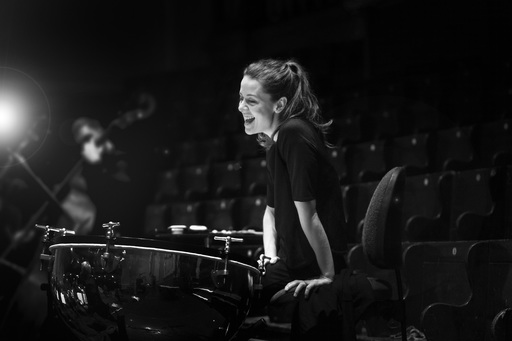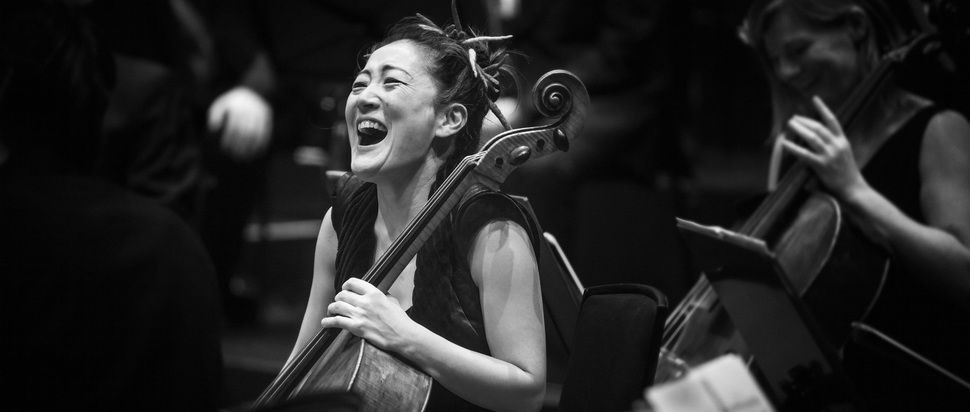Switch It Up: Scottish Chamber Orchestra on UN:TITLED
Ahead of their forthcoming UN:TITLED series, we speak to co-curators Su-a Lee and Louise Goodwin from the Scottish Chamber Orchestra to find out more
“I'm all for taking classical music into places where it's not usually played and presenting it live to a different type of audience,” says Su-a Lee, sub-principal cellist with the Scottish Chamber Orchestra. “People from the non-classical music scene, new music lovers, who wouldn't normally hear this type of thing. The idea of stepping away from the traditional concert hall setup – early evenings, with an overture followed by a concerto and an interval and then a symphony – switches it up a bit, presenting music without expectations and then taking you on a journey.”
This has been at the core of what the SCO has been pursuing since live performance became possible again post-lockdown, and it’s being driven by a diverse and forward-thinking group of players within the orchestra. The latest performance to follow this ethos is UN:TITLED – following on from the New York Counterpoint concerts, which were presented in collaboration with The Skinny and EHFM back in March – shows which have been thoughtfully put together by Lee and her co-curator Louise Goodwin, a percussionist and ace timpanist with the SCO.
The approach promotes cultural accessibility, as well as just logistical or financial accessibility, blurring the borders between scenes and interests to bring audiences into the sphere of the SCO, much like how the Scottish Ballet’s recent modernised production of Coppélia promoted a traditional artform in a thrilling and zeitgeisty way.

Scottish Chamber Orchestra timpanist Louise Goodwin. Photo: Stuart Armitt
“For years, classical music has made a mistake in thinking accessibility equates only to cheap ticket prices,” says Goodwin. “It should also be about doing stuff in places people are used to. Sometimes the silence of a concert hall is absolutely the right way to experience music, in the same way that in a cathedral you’re sitting silently and people are being really respectful of that space. That’s a beautiful thing. But not all music has to be absorbed like that.”
It works both ways – the players get as much out of the turn as the SCO hopes audiences will, says Goodwin. “I feel like it's necessary to diversify what I'm doing as a musician. In the SCO, we have an amazing way of forming our core repertoire – our Mozarts and our Beethovens. But it's really interesting when we get into this more challenging work and out of our comfort zones. Also, in classical music we need to get out of that box of just presenting the same stuff over and over and thinking people might start coming that aren't already, hoping that if we keep pushing the same material they'll change their minds. Actually, by showing something a bit different, maybe we can show people there is a pathway in.”
For UN:TITLED, the SCO will be pushed by the venues – St Luke’s in Glasgow and Summerhall in Edinburgh – which won’t allow for as many players as their usual settings and will “provide a tonal shift”, says Goodwin. And the pieces Lee and Goodwin have chosen span electronic and experimental work from varied composers like Gabriella Smith, Andy Akiho and Steve Reich. The Reich Double Sextet, which can include six players performing against a tape recording of themselves adroitly ties in with the limitations of the show, allowing for the smaller cohort to seem as expansive and layered as a larger one on an intimate stage. Further complicating (in a good sense) the picture is the involvement of a DJ, producer Dolphin Boy, while Gemma Cairney, a familiar face and voice from BBC Radio 1 and 6 Music, will MC the nights, providing a conversational and populist tone to proceedings.
“I think it's funny because we are an orchestra and we do what we do very well, and genuinely really enjoy the classics,” says Goodwin. “But at the same time, I also listen to pop music, I'm not a person who kind of lives as though I'm in the 1800s listening only to music of that time. So, I think the programme we're presenting kind of bridges that gap.”
“We've always wanted to push the boundaries of what we do in the classical world,” says Lee, whose work on cello has seen her cross genres and perspectives. “Part of this new series was seeing what we could do with a wide-ranging combination of instruments under the constraints of a reduced group of players. The pieces we settled on are all very exciting, as is working with the performers to see how it all binds together.”
While classical and neoclassical music can feel siloed from popular music, Goodwin is enthusiastic about the potential for the form to become exciting to all. “We're listening to these textures and sounds every day in pop music. It's just kind of been in the background. But when it’s packaged in a way where people can have an emotional connection to the music – like in film score work, for example – there’s more of a reference point than it just being this abstract concept.”
UN:TITLED takes place at Summerhall, Edinburgh, 29 Oct; St Luke's, Glasgow, 30 Oct
